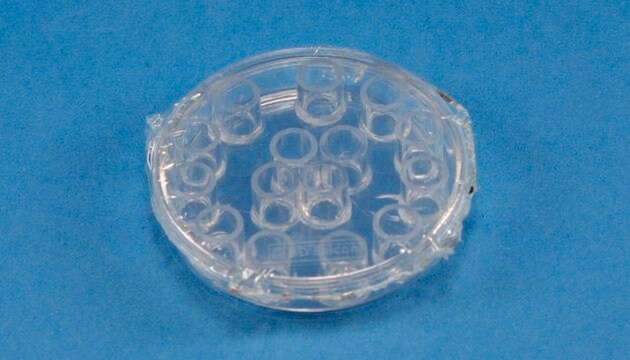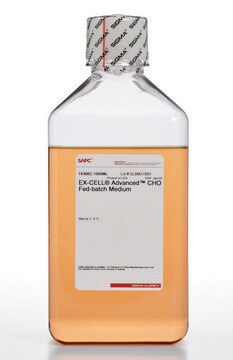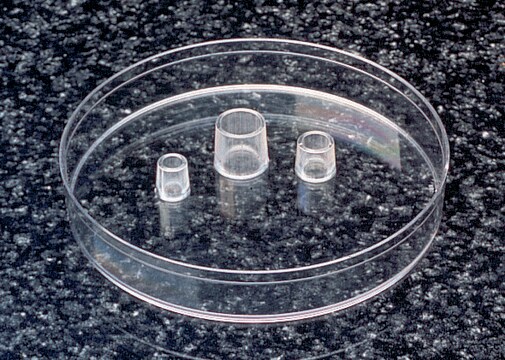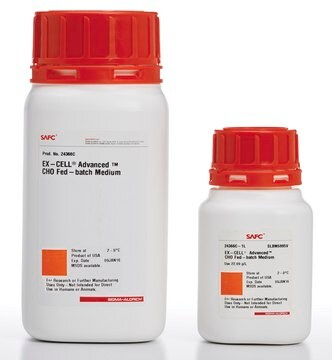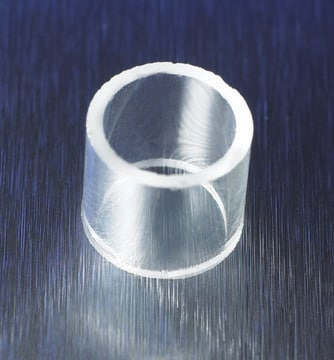C9098
Milieu CHO
Animal-component free, without L-glutamine, use at 21.5 g/L, dry powder, suitable for cell culture
Fabrication pharma
Synonyme(s) :
CHO Medium
About This Item
Produits recommandés
Niveau de qualité
Description
for research or for further manufacturing use
Forme
dry powder
Qualité
Drug/Device Master File available
Concentration
21.5 g/L
Technique(s)
cell culture | mammalian: suitable
Température de stockage
2-8°C
Vous recherchez des produits similaires ? Visite Guide de comparaison des produits
Caractéristiques et avantages
Autres remarques
Does not contain antibiotics, antimycotics, L-glutamine, or transferrin. Contains no animal-derived proteins or other components.
Reconstitution
1. Measure out 90% of final required volume of tissue culture grade water. Water temperature should be 25-40oC.
2. While stirring the water, add the powdered medium (21.5 g/L). Heat may enhance solubility but do not go above 40oC.
3. Rinse original package with a small amount of water to remove all traces of the powder. Add to solution in step 2.
4. Stir until dissolved.
5. Add 0.6g/L (range 0.6-1.2g/L or higher depending on individual cell line) of G3126 L-Glutamine.
6. Add 1.5 g/L of S8875 sodium bicarbonate (If increased buffering capacity is desired this amount can be increased to 3.0 g/L).
7. Adjust the pH to 7.45 range (7.3-7.6) using 5 N NaOH.
8. Use additional water to bring the solution to final volume.
9. Sterilize immediately by filtration using a membrane with a porosity of <0.22 microns. Do not use poly-ether sulfones (PES) type of membranes. We recommend PVDF as the best inert type of filter membrane.
10. Aseptically dispense medium into a sterile container. Store at 2-8 °C in the dark.
Informations légales
Supplément
Code de la classe de stockage
11 - Combustible Solids
Classe de danger pour l'eau (WGK)
WGK 3
Point d'éclair (°F)
Not applicable
Point d'éclair (°C)
Not applicable
Certificats d'analyse (COA)
Recherchez un Certificats d'analyse (COA) en saisissant le numéro de lot du produit. Les numéros de lot figurent sur l'étiquette du produit après les mots "Lot" ou "Batch".
Déjà en possession de ce produit ?
Retrouvez la documentation relative aux produits que vous avez récemment achetés dans la Bibliothèque de documents.
Les clients ont également consulté
Articles
A signal peptide is a 5-30 amino acid (aa) peptide present at the N-terminus of secretory proteins.
The Glutamine Synthetase (GS) expression system does not typically require multiple rounds of amplification to isolate high-producing clones (Brown, 1992).
In the present study, we have identifi ed species-specifi c housekeeping genes (HKGs) for Chinese Hamster Ovary (CHO) cells using data from microarray gene expression profiling.
MGAT1 adds N-acetylglucosamine to the Man5GlcNAc2 (Man5) structure. Goh et al. reported increased sialylation after restoring MGAT1 function in MGAT1 deficient CHO cells.
Notre équipe de scientifiques dispose d'une expérience dans tous les secteurs de la recherche, notamment en sciences de la vie, science des matériaux, synthèse chimique, chromatographie, analyse et dans de nombreux autres domaines..
Contacter notre Service technique
